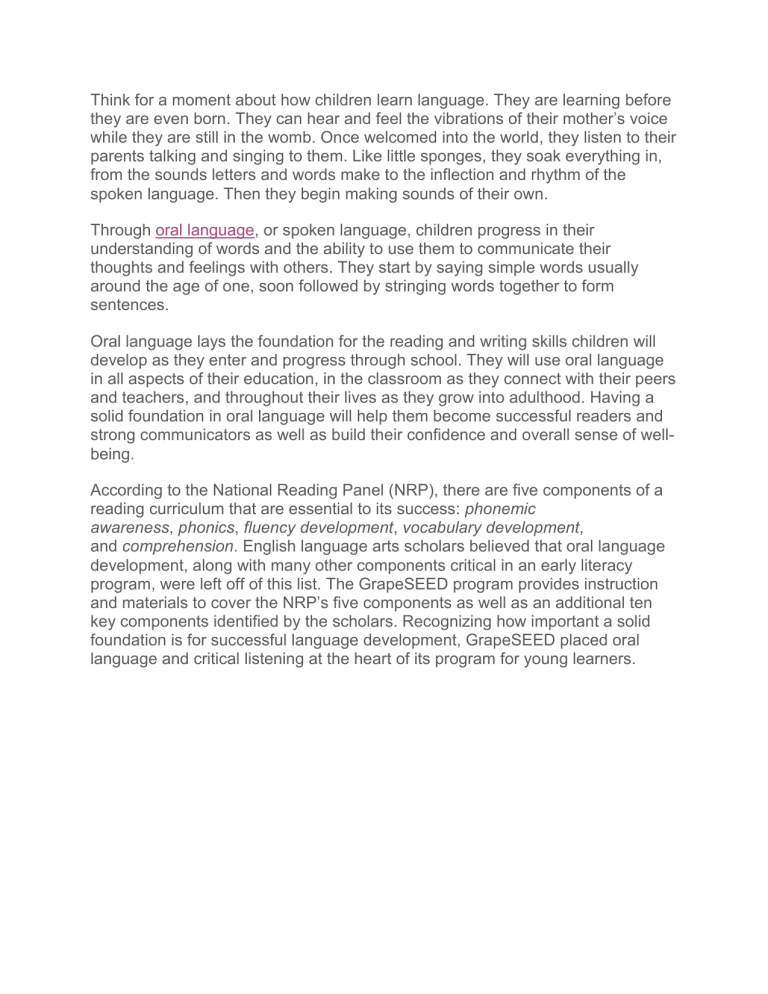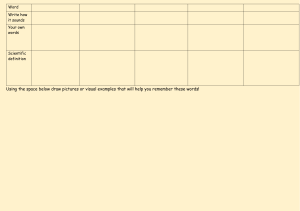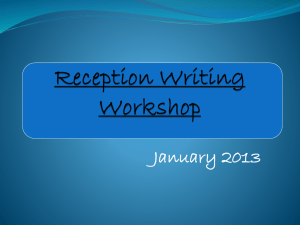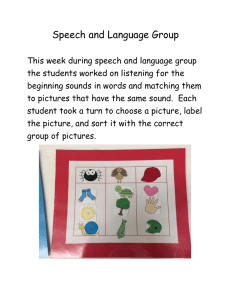
Think for a moment about how children learn language. They are learning before they are even born. They can hear and feel the vibrations of their mother’s voice while they are still in the womb. Once welcomed into the world, they listen to their parents talking and singing to them. Like little sponges, they soak everything in, from the sounds letters and words make to the inflection and rhythm of the spoken language. Then they begin making sounds of their own. Through oral language, or spoken language, children progress in their understanding of words and the ability to use them to communicate their thoughts and feelings with others. They start by saying simple words usually around the age of one, soon followed by stringing words together to form sentences. Oral language lays the foundation for the reading and writing skills children will develop as they enter and progress through school. They will use oral language in all aspects of their education, in the classroom as they connect with their peers and teachers, and throughout their lives as they grow into adulthood. Having a solid foundation in oral language will help them become successful readers and strong communicators as well as build their confidence and overall sense of wellbeing. According to the National Reading Panel (NRP), there are five components of a reading curriculum that are essential to its success: phonemic awareness, phonics, fluency development, vocabulary development, and comprehension. English language arts scholars believed that oral language development, along with many other components critical in an early literacy program, were left off of this list. The GrapeSEED program provides instruction and materials to cover the NRP’s five components as well as an additional ten key components identified by the scholars. Recognizing how important a solid foundation is for successful language development, GrapeSEED placed oral language and critical listening at the heart of its program for young learners. Oral language and critical listening are skills often missing from reading and writing programs, leaving teachers to wonder why their students are still struggling or taking longer than expected to become proficient speakers and readers. GrapeSEED’s focus on building these essential skills is one of the reasons the program is so successful. Children must be able to understand the language they are hearing and reading in school in order to thrive as readers, writers and communicators. Through carefully designed multi-sensory materials, GrapeSEED keeps children engaged and helps them learn language naturally. As a result, independent research shows that GrapeSEED students are reaching English proficiency in speaking and reading faster than the national average and are closing the achievement gap in language. Contact us to learn how! In this lesson, learn what oral language skills are and the components of oral language. We will also cover how you, as an educator, can assess oral language skills. Oral Language Skills We all communicate with each other in many different ways throughout our lifetime. One of the most common ways is through speaking to each other. Most people communicate with each other through speaking without any issues. That isn't a skill we're born with, though. We arrive knowing how to make sounds, but our oral language skills, or ability to communicate through speaking, developed over time. As an educator, you had to learn how to communicate various lessons to your students. This required development of your oral language skills. Now that your skills are developed, it's time to help your students develop their oral language skills. You first have to know exactly what makes up oral language skills in order to know how to successfully teach them to students and assess them. Oral Language Components Probably the most obvious part of oral language skills is vocabulary, or the understanding of different words. There are a countless numbers of words and, if prompted, almost anyone could mimic the sounds of the words. That doesn't mean that you have a clue as to what you just said, though. In order to effectively communicate, students must learn the meanings of different words. This component of oral language skills will aid in selecting the correct word for what's being communicated. While we just explained that anyone can make the sounds of a word, we should make sure we don't take away from the importance of the phonological skills. These are important in order to ensure the correct pronunciation of a word. Phonological skills include speaking words using the correct sounds and syllables. Having a functional understanding of grammar rules and the order of words for the language is also crucial. We refer to this as syntax. Think for a minute about the last time that you started learning a foreign language. You learned many words used in the language, but it meant very little until you learned how to put the words together to form sentences that someone else speaking that language can understand. The next component of oral language skills is understanding the word parts and forms, known as morphological skills. These skills deal with the three different parts of a word: the prefix, the root word, and the suffix. They also deal with knowing how to put these components together and take them apart to alter the meaning of a word. For instance, you know how to change the meaning of the word order by altering it using prefixes like ''re-'' and suffixes like ''ed-'' to get reorder and ordered. The last component is pragmatics, which deals with understanding the social rules of communication. This mainly involves knowing when it's appropriate to speak and when it's not. Not interrupting others when they speak is a classic example of the pragmatics of oral language. So those are the components of oral language skills. You likely already have some idea of how to teach and even demonstrate these skills. However, how can you effectively assess whether or not your students have these skills? 1. Oral language, starting from the words and sounds a baby hears at birth, is how written language is formed. Of course, written language is more deeply formed by access to education, but oral language is where it all begins. Oral language helps children develop an initial understanding regarding letter sounds and forms, phonemic awareness, and syntax, all of which are related to a students ability to read. My cousin just recently had a baby boy, and every time we see him, she always asks us to talk to him as much as we can. I always knew it was important to talk to a baby to develop their oral language skills and their social skills, but now it makes even more sense as it is related to their written language skills as well. One part of the article that really stuck out to me was when it stated “If children come to school with well-developed oral language, it must be expanded. If children come to school with underdeveloped oral language, it must be developed.” When I was in AmeriCorps, I was a reading intervention teacher for grades K through 8. I worked with a lot of young students who had just moved from developing countries with their families. I had one student in particular who, even though he was so young, spent his days not in school but sitting on a farm as his parents worked. Because of this, he received little verbal communication and interaction with others. When he came to us, we realized that though he was a Spanish speaker, his basic reading skills were still underdeveloped in Spanish. His vocabulary understanding was very poor, along with his sentence structure and letter sounds in his native language. It was clear to us as teachers that this was more than just an EL student, but a student who was not able to develop his skills at a young age and in turn, his reading skills were being negatively affected. Reflecting on what I have learned about the importance of oral language skills in order to read and develop written language skills, it makes more sense now as to why the student struggled due his lack of interaction with others. REPLY 2. 3. Without building these skills through oral language in their early years, students written language and reading will suffer. 4. Also, we talked in class at length about how students gain a strong vocabulary in their early years through oral language. Without building a strong vocabulary base through oral language, a child’s written language will also suffer in this way. I have seen students who have had a severe struggle in writing all the way up until their senior year because they lacked a strong and wide range of vocabulary in their everyday use. Oral language intertwine like a rope. it is important to know that they are not mutually exclusive. It was interesting to learn about how oral language starts at such an early age and the changes that occur overtime in a child until adulthood. Oral language paves the foundation for helping students advance through reading and writing skills at each grade level. Students enhance their understanding of words and learn how to communicate their feelings, thoughts, or opinions because of oral language. Using oral language is imperative because it allows students the ability to connect with teachers, classmates, and transfer this skill into their daily life routines. The written language of a student will vary depending on different variables that coincide with having a strong oral language foundation to start when enrolling into school. Oral language influences the student’s knowledge of vocabulary, sounds of letters or word patterns, sentence structure, and grammar. Personally, I think phonemic awareness is truly the most important element that stems from oral language. Phonemic awareness is the basis for students to know that letters have sounds and the various combination of letters will produce a word that has a specific sound or word meaning. At early age, students come to understand through reading grade level text that blending words and letters together creates meaning into written language as well. A student with strong written language has a solid foundation for vocabulary words and meaning to express written responses to text in greater detail. Students are routinely told to provide evidence when responding to a text and oral language plays an essential role to guide them through that process. I’m going to take what I learned in EDU 571 about oral language when observing how my students perform in the classroom now. As a child, you learn oral language first. You learn the alphabet, how to make sounds, how to say words, and how to use those words in conversations. more developed your oral language is the developed your written language will be. Our end goal is that all students will meet this bar, but will meet it in different ways. When it comes to reading and writing this stands very true. As students develop, I am able to see significant differences between students depending on what their home life is or was as a younger child and presently. During class, I found it very interesting to hear the difference in how many words children from different settings are hearing. It is amazing, how this could positively or negatively effect a child’s speech and language development. finding is highly influenced on how much appropriate exposure a child has had in order to develop those skills. A child’s success in learning to read depends on several factors, such as how well a child can interpret printed words, how much appropriate and quality oral language models a child has been exposed to, and if effective materials and instruction have been implemented. As a child, you learn to talk before you write, so having the ability to communicate effectively at a young age will help in the long run with writing and reading. Young students begin with oral language at home, and when transitioning to school are assessed for what oral speaking requirements This means that a child that is exposed to more oral language during infancy and toddler years usually enter school ahead of their peers. This helps them advance their reading and writing skills at a faster rate. When we have a large language bank to pull from we can form sentences with ease. Knowing more vocabulary and understanding it helps us to form written sentences. When we can speak sentences correctly we can write sentences correctly. If we don’t have a large vocabulary or can only speak in simple sentences we will most likely only be able to write in simple sentences too. This correlation is strong; when we have a large vocabulary we can be more successful with our writing. REPLY Without the oral language children will not be able to recognize the words they are trying to read. it has to do with speaking and listening to conversation at a young age.



